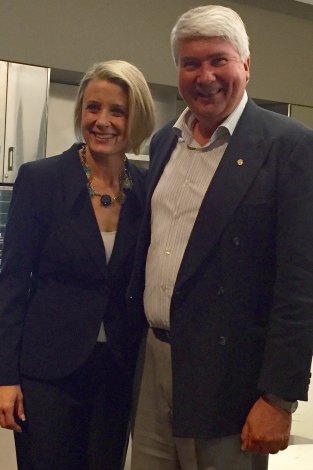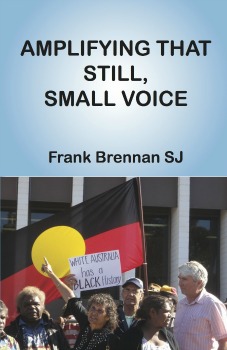In recent days we have heard a great deal about dual citizenship, and in particular, whether one can lose Australian citizenship when holding dual nationalities.
 Some of us may find that debate unconscionable.
Some of us may find that debate unconscionable.
The man whose work we celebrate tonight is, in fact, a dual citizen. He is an Australian, of course, and one of the highest order, having been acknowledged as both an Officer in the Order of Australia and a National Living Treasure.
He is also a citizen of the Republic of Conscience.
Frank begins his latest work with a reflection on Seamus Heaney's poem 'From the Republic of Conscience':
I came back from that frugal republic with my two arms the one length,
the customs woman having insisted that my allowance was myself.
The old man rose and gazed into my face and said that was official recognition that I was now a dual citizen.
He therefore desired me when I got home to consider myself a representative and to speak on their behalf in my own tongue.
Their embassies, he said, were everywhere but operated independently
and no ambassador would ever be relieved.
Frank Brennan says that, as a priest and a lawyer, he has always regarded himself as an ambassador for conscience.
I agree. In fact, I would be pleased to move his nomination as the President of the Republic of Conscience.
I urge each of you, I urge all of citizens of Australia, to think of Frank Brennan's book as a handbook for grappling with the matters of conscience that challenge our nation.
Rarely is a book so aptly timed for when a population needs it most.
Rarely is a book so aptly timed for when a nation's political leadership needs it most.
It is tempting to see this book as a contemporary traveller's guide to the Republic of Conscience — written for those who want to journey there from the Commonwealth of Australia. All the tourist hotspots are covered.
Same sex marriage. Aboriginal reconciliation. Dealing with asylum claims. Dealing with child sexual abuse. Euthanasia. Pursuing Human Rights. Celebrating a new Pope.
I don't want to tell you what Frank says or seek to summarise his words. He might tell you himself shortly, or you can read it for your own journey.
What I want to do is give you an insight on how important it is that we have a person in our church and in our world who speaks powerfully on the importance of conscience.
First of all, to have such a person in our church.
As a Catholic I am often grateful that Frank Brennan's voice is one that speaks out on conscience in our church.
Conscience is a tricky area when one wants to claim it as a basis for disagreeing with the Church's official teaching. It often leads to accusations of being a 'cafeteria Catholic', choosing only the parts of Church teaching you want to agree with.
I find this ironic, given that the Church has never explicitly claimed infallibility on a moral teaching, and has altered its own views over the years in response to cultural changes, e.g., on usury.
The Second Vatican Council declares we are bound to follow our conscience faithfully; that we cannot be forced to act in a manner contrary to our conscience. But a conscience must be properly formed. Conscience is not a feeling; it is a decision to act based on thorough consideration.
 A Catholic conscience must give attention and respect to Church teachings, but is also bound to consider science, reason, human experience, scripture and other theological reflection.
A Catholic conscience must give attention and respect to Church teachings, but is also bound to consider science, reason, human experience, scripture and other theological reflection.
A Catholic has an obligation to follow her fully-formed conscience, even if it brings her into conflict with church teaching.
Certain church leaders, especially during John Paul II's papacy, have sought to redefine conscience in order to discourage debate and dissent, but the role of a fully-formed conscience in the life of Catholics is significant and cannot be extinguished.
Frank Brennan says he wants to be an ambassador for conscience. I say he is a shining light. Frank has never let the still, small voice of conscience be silenced either by self-interest or by unquestioning acceptance of authority.
Whether discussing how to welcome Aboriginal people into the church or how to deal with the scourge of child sexual abuse or how to approach the issue of same sex marriage from a perspective of faith, Frank Brennan has examined his own conscience and amplified his voice.
In doing so he stands as a beacon that reminds us all that our duty as Catholics, as faithful followers of God, is to listen for God's voice in that still, small voice that is our conscience.
As a legislator, I also often felt gratitude for Frank Brennan's ambassadorship from the republic of conscience. Much is made of the opportunities MPs have in a conscience vote — of this free chance to 'speak their minds' — as if they operate like mindless robots at all other times. As if they regularly violate their consciences when toeing the party line.
I did not find occasion to violate my conscience — ever — in a party vote. Not even close. But I found it most difficult to wrestle with the demands of the public, the varying expectations in the community, and my own faith commitments and assumptions about what I believed whenever I was faced with a conscience vote.
Frank has divided this book into two parts — amplifying that still, small voice in the church, and amplifying the still small voice in the world. But that delineation is not neatly made — and Frank would concede this easily. His book, though organised in this way, effortlessly weaves together his commitments and wisdom as both a priest and a lawyer, a man of faith and a man of the world.
As a legislator and a Catholic I found this need to weave, this need to take 'data points', if you will, from many places and form my conscience. The human experience of my community, my own experience, the expert advice from legal and scientific and academic worlds, the teachings of my faith. It was hard at times, challenging, humbling and ultimately satisfying.
Perhaps the most humbling and eye-opening aspect of wrestling with my conscience in a very public manner is how hungry the public often was to consume what I and my colleagues offered in a conscience vote debate.
We often hear about what the public wants, about public opinion polls, and we might mistakenly believe that most members of the public are fixed and certain in their views.
But if anything, members of the Australian public, our fellow citizens of Australia, crave leadership and examples of how to openly, honestly, and fully form a conscience and arrive at a conscientious decision.
When I was in parliament, Frank Brennan, to me, always stood as an example of how to do this, and more importantly, the insistence that this must always be done. In fact, I regarded him as a bit of a hero.
His parents, Sir Gerard and Patricia Brennan, could not be here this evening. Sir Gerard wrote to me saying, 'Could I ask you to record the apologies of Patricia and myself? Frank has lavished his kindness on us by dedicating the book to his parents and we regret we cannot be at the public celebration of its publication. But we are extremely proud of his integrity, his courage and, above all, his faithful love of Christ and his deep but questioning love of Christ's Church.'
I cannot think of better words with which to launch this book, Amplifying That Still, Small Voice.
Kristina Keneally is a politcal commentator and a former Labor Premier of NSW. The above text is from her launch of Fr Frank Brennan SJ's book Amplifying That Still, Small Voice at Our Lady of the Way Parish, North Sydney, 2 June 2015.